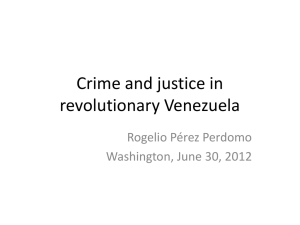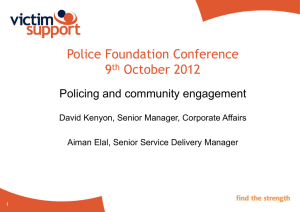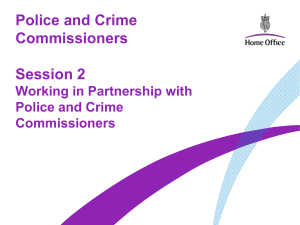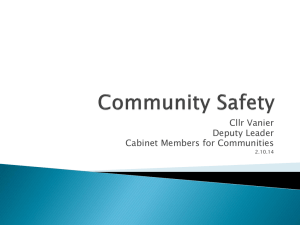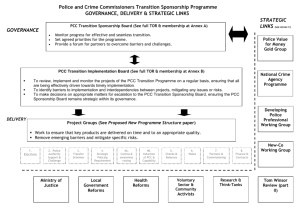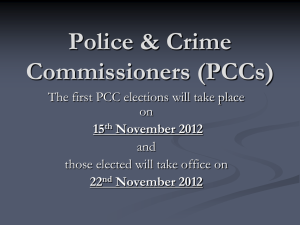Police & Crime Commissioners (PCCs)
advertisement
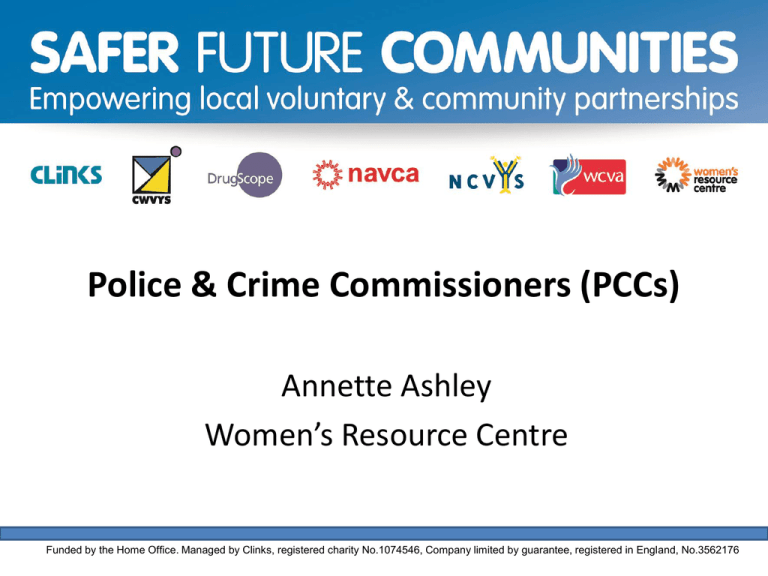
Police & Crime Commissioners (PCCs) Annette Ashley Women’s Resource Centre Funded by the Home Office. Managed by Clinks, registered charity No.1074546, Company limited by guarantee, registered in England, No.3562176 About Women’s Resource Centre • National support body for the women’s sector • We provide training, information, resources and one to one support • We lobby decision makers on behalf of the women’s sector for improved representation and funding • We have over 400 members Police and Crime Commissioners • Police Reform and Social Responsibility Act 2011, introduces elected Police and Crime Commissioners (PCCs) in England and Wales, from November 2012 • New Police and Crime Panels, comprising local authority representatives plus two independents, scrutinise PCCs, replacing Police Authorities PCC powers and responsibilities • Hold the Police Service to account • Appoint the Police Commissioner/Chief Constable • Publish statutory 5 year Police and Crime Plan, and an annual report of progress against the Plan • Determine local policing priorities • Set a local precept and set the annual force budget in consultation with the Chief Constable London is different! • Mayor of London acts as the PCC for London and appoints a Deputy to carry out the role • Deputy Mayor for Policing and Crime (DMPC) heads a new department, the Mayor’s Office for Policing and Crime (MOPAC) • New London Assembly Police and Crime Committee replaces Metropolitan Police Authority, acting as Police and Crime Panel to scrutinise the work of the Mayor, his DMPC and the MOPAC PCC powers and responsibilities • Able to commission services from outside the police force. They will act as commissioners for all local victim support services • Work with Chief Constables and local partners such as probation, health, education and local voluntary organisations to not only fight crime and antisocial behaviour, but to prevent it • Oversee Community Safety Partnerships (CSPs) Safer Future Communities Project • Home Office funded project November 11 – March 13 • Aims to support VCS in England and Wales to engage and influence the PCC in their area • National partnership, led by Clinks SFC Network activities • Development of a local SFC Network of VCSE organisations in each police area to engage with the PCC, including on the development of local Police and Crime Plan, and also with the Commissioner as a commissioner of services • Support the Sector to develop the case, specifically the business case, for retention of existing services and new approaches Network activities continued… • Convene thematic consultative groups for commissioning processes • Support VCOs and SEs in obtaining contracts to deliver services, including formation of consortia • Work collaboratively with other VCS organisations, networks and forums • Develop Network structures and processes for member representation, consultation and activity How could the election of PCCs impact upon women and their organisations? • The Community Safety Fund (CSF) will be transferred from the CSP to the PCC. Existing funding streams to address VAWG will be diverted to this new fund and will no longer be ring-fenced. PCCs will determine how and if VAWG services get funded • What can women’s organisations do? • Engage with SFC local network lead • Organise strategy meeting with women’s orgs in their region • Organise/attend hustings events and ask what they will do to tackle violence against women and girls if elected • Tweet/follow the candidates • Distribute WRC/EVAW/RC flyer What we are asking PCC candidates to commit to… • Making VAWG a top priority in their Plan • Funding women’s services • Consulting women’s groups to develop a VAWG strategy and then appoint a senior person to lead • Running public campaigns to challenge myths and stereotypes about VAWG • Do say: this fits into the Coalition’s broader localism agenda, which aims to give power back to local communities and ensure they have a role in improving community safety and reducing crime • Don’t say: it’s back-door privatisation of the police and a transfer of responsibility for the spending cuts to local police forces… For further information or support please contact the Women’s Resource Centre My contact details: Annette Ashley Tel: 020 7324 3058 Email: annette@wrc.org.uk Twitter: @whywomen
